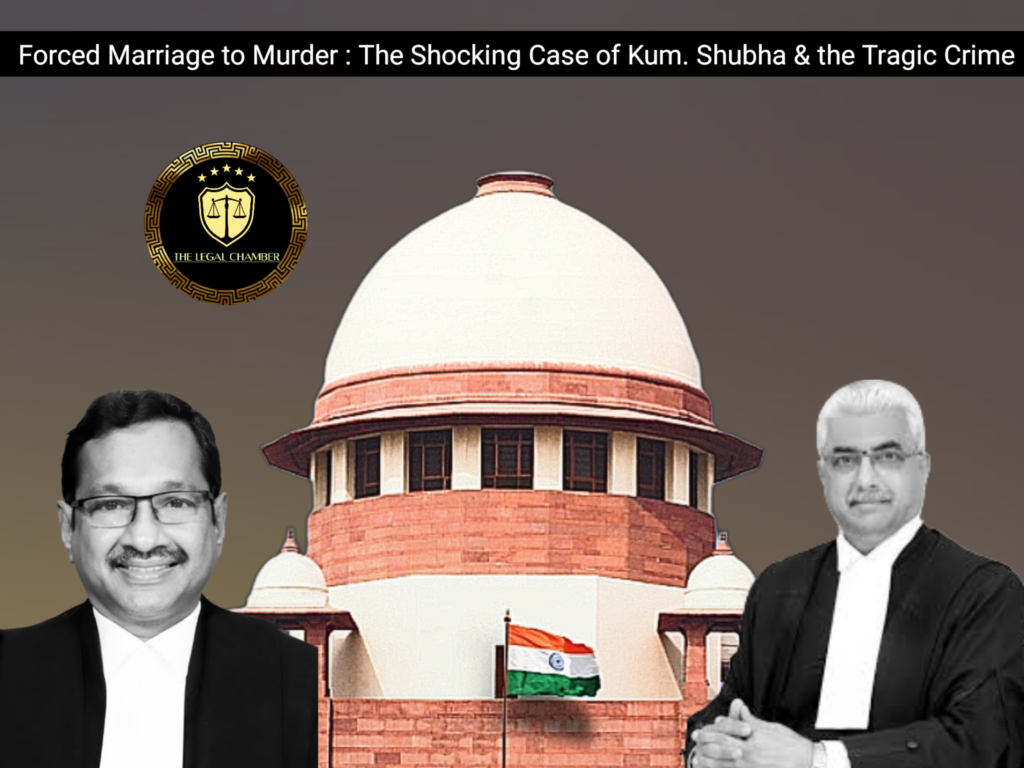
The Supreme Court upheld the conviction of the appellants under Section 302 read with Section 120-B IPC for conspiring to murder the deceased, relying on circumstantial evidence, including Call Detail Records (CDRs) and motive established through witness testimonies. The Court clarified the admissibility of electronic evidence under Section 65-B of the Evidence Act and emphasized that constitutional powers under Article 161 (pardoning power of the Governor) remain exercisable despite statutory remission rules. The judgment reaffirmed the principles of Sharad Birdhichand Sarda for circumstantial evidence while dismissing appeals but allowed the convicts to seek pardon.
Facts Of The Case:
In December 2003, Kum. Shubha (A-4), a 20-year-old law student, was engaged to B.V. Girish (deceased), a software engineer, against her wishes. Unhappy with the arranged marriage, she confided in her college friend Arun Verma (A-1), who conspired with his cousin Dinesh (A-3) and teenager Venkatesh (A-2) to murder Girish. On 3 December 2003, Shubha lured Girish to a secluded spot under the pretext of watching airplanes, where A-2 fatally attacked him with a steel rod. Shubha then took Girish to the hospital, where he died the next morning. The prosecution relied on eyewitness accounts (PW-15 & PW-16), Call Detail Records (CDRs) showing extensive communication between the accused before and after the crime, and recovery of the murder weapon (M.O.11) and the scooter (M.O.12) used in the crime. The Trial Court and High Court convicted all four under Section 302/120-B IPC, sentencing them to life imprisonment. The Supreme Court upheld the conviction, rejecting the defense’s challenge to CDR admissibility under Section 65-B of the Evidence Act. While dismissing appeals, the Court allowed the convicts to seek clemency under Article 161, considering their long incarceration and possible reform.
Procedural History:
The case originated with the FIR registered on 4 December 2003 under Section 302 IPC against unknown persons after Girish’s murder. Following investigation, A-1 to A-4 were arrested on 25 January 2004, and a chargesheet was filed on 17 April 2004, followed by a supplementary chargesheet on 10 January 2005. The Trial Court (Sessions Court, Bangalore) convicted all accused on 13 July 2010, sentencing them to life imprisonment under Section 302 read with 120-B IPC, with A-4 additionally convicted under Section 201 IPC for destroying evidence. The High Court of Karnataka, in appeals filed by both the accused and the State, upheld the convictions on 16 September 2011 but modified the charges, convicting all accused under Section 302 read with 120-B IPC (instead of separate convictions). The Supreme Court, in Criminal Appeal Nos. 1029, 1030, 1225 of 2011 & 2943 of 2025, dismissed the appeals on 14 July 2025, confirming the life sentences. However, it granted the convicts eight weeks to seek pardon under Article 161 (Governor’s clemency power), suspending their sentence pending the decision. The judgment reinforced the admissibility of CDR evidence under Section 65-B of the Evidence Act and upheld the principles of circumstantial evidence from Sharad Birdhichand Sarda.
READ ALSO:Supreme Court Landmark Ruling: Skilled Worker Gets Higher Disability Compensation
Court Observation:
The Supreme Court made several critical observations while upholding the convictions. It emphasized that circumstantial evidence, including the voluminous call records between the accused, formed a complete chain pointing unequivocally to their guilt, satisfying the five principles from Sharad Birdhichand Sarda. The Court rejected challenges to the admissibility of CDR evidence, ruling that the Section 65-B certificates were properly authenticated despite being secondary evidence. Significantly, the Bench noted that A-4’s conduct—including her constant communication with co-accused before the murder and deletion of phone messages—demonstrated active participation in the conspiracy. While acknowledging the social context of forced marriage, the Court stressed this couldn’t justify homicide.On sentencing, the judgment recognized the reformative potential of the convicts after two decades in prison. It highlighted that Article 161 (Governor’s pardon power) operates independently of statutory remission schemes, allowing consideration of their rehabilitation. However, the Court clarified this observation didn’t dilute the gravity of their premeditated, brutal crime against an innocent victim.
Final Decision & Judgement:
The Supreme Court, in its final judgment dated 14 July 2025, dismissed all appeals and upheld the life imprisonment sentences of all four accused under Section 302 read with Section 120-B IPC for their roles in the premeditated murder of B.V. Girish. The Court confirmed A-4’s additional conviction under Section 201 IPC for destroying evidence. While maintaining the severity of the punishment, the Bench granted limited relief by permitting the convicts to file mercy petitions before the Governor of Karnataka under Article 161 of the Constitution within eight weeks, and suspended their sentences pending the Governor’s decision. The judgment reinforced that electronic evidence (CDRs) was legally admissible under Section 65-B of the Evidence Act, and the circumstantial evidence conclusively established their guilt beyond reasonable doubt. The Court refused to commute the sentences but left the door open for constitutional clemency, balancing the demands of justice with principles of reformation.
Case Details:
Case Title: Kum. Shubha @ Shubhashankar v. State of Karnataka & Anr. Citation:2025 INSC 830 Criminal Appeal No.: 1029 of 2011 Date of Judgment: 14 July 2025 Bench: Justice M.M. Sundresh & Justice Aravind Kumar
Download The Judgement Here